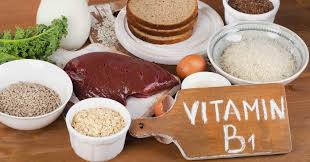Thiamine, also known as vitamin B1, is an essential water-soluble vitamin that plays a crucial
role in maintaining overall health and well-being. It is one of the eight B vitamins and is
involved in various metabolic processes within the body. Thiamine is necessary for the proper
functioning of the nervous system, energy production, and the metabolism of carbohydrates.
Characteristics:
Thiamine is a colorless, crystalline compound with a chemical formula of C12H17N4OS. It is
stable in acidic conditions but can be easily destroyed by heat, light, and alkaline environments.
As a water-soluble vitamin, it is not stored in large amounts in the body, and excess amounts are
excreted through urine. Therefore, it needs to be regularly obtained through the diet to prevent
deficiency.

Source of B1:
Thiamine is naturally found in a wide range of foods, both plant-based and animal-based. Some
of the richest sources of thiamine include:
Whole grains: Foods such as wheat germ, brown rice, oats, and whole wheat bread are excellent
sources of thiamine.
Legumes: Beans, lentils, peas, and soybeans are rich sources of thiamine.
Nuts and seeds: Sunflower seeds, flaxseeds, pistachios, and peanuts contain significant
amounts of thiamine.
Pork: Pork products, including lean pork chops and ham, are excellent sources of thiamine.
Organ meats: Liver and kidney from various animals are particularly high in thiamine
content.
Fish: Tuna, salmon, and mackerel are some examples of fish that contain thiamine.
Dairy products: Milk, cheese, and yogurt provide moderate amounts of thiamine.
Vegetables and fruits: Spinach, asparagus, Brussels sprouts, oranges, and watermelon are
among the plant-based sources of thiamine.
Features and Functions:
Thiamine plays several important roles in the body, contributing to overall health and well-being.
Some of its key features and functions are as follows:
Energy production: Thiamine is an essential coenzyme in the metabolism of carbohydrates,
helping convert glucose into energy. It plays a critical role in the synthesis of adenosine
triphosphate (ATP), primary energy currency.
Nervous system support: Thiamine is vital for the normal functioning of the nervous
system. It aids in the production of neurotransmitters, including acetylcholine, which is involved
in memory and muscle control.
Brain health: Thiamine is necessary for optimal cognitive function and brain health. It
supports the production of myelin, a substance that protects nerve cells and promotes efficient
communication between them.
Cardiovascular health: Thiamine helps maintain a healthy cardiovascular system by
promoting the proper functioning of cardiac muscles and ensuring the smooth flow of blood
throughout the body.
Antioxidant properties: Thiamine acts as an antioxidant, protecting cells from oxidative
stress and damage caused by harmful free radicals.
Digestive health: Thiamine is involved in the production of hydrochloric acid in the stomach,
promoting proper digestion and nutrient absorption.
Growth and development: Thiamine is essential for the growth and development of
tissues, particularly in children and adolescents.
Alcohol metabolism: Thiamine is crucial in the metabolism of alcohol and helps prevent or
alleviate the symptoms of alcohol-related disorders, such as Wernicke-Korsakoff syndrome.
Thiamine Deficiency:
Insufficient intake or absorption of thiamine can lead to thiamine deficiency, also known as
beriberi. Symptoms of thiamine deficiency can vary and may include fatigue.
Thiamine, also known as vitamin B1, is an essential nutrient required by the body for various
physiological processes. Thiamine plays a crucial role in converting carbohydrates into energy
and is involved in the functioning of the nervous system. When the body lacks an adequate
amount of thiamine, it can lead to a condition called thiamine deficiency.Thiamine deficiency
can occur due to several reasons, including inadequate dietary intake, malabsorption, excessive
alcohol consumption, and certain medical conditions.
Symptoms:
- Fatigue and weakness
- Loss of appetite
- Weight loss
- Irritability
- Confusion and memory problems
- Muscle weakness and pain
- Numbness or tingling sensation in the extremities
- Difficulty walking or coordination problems
- Rapid heartbeat
- Digestive issues such as constipation or nausea
- For more diseases click here.
Severe thiamine deficiency can lead to a condition called beriberi, which can affect the cardiovascular system (wet beriberi) or the nervous system (dry beriberi). Wet beriberi involves symptoms like swelling, increased heart rate, and heart failure, while dry beriberi affects the nervous system, causing muscle weakness, difficulty walking, and impaired reflexes.
Treatment of B1 deficiency:
Thiamine deficiency is usually treated by increasing thiamine intake through dietary changes and
supplementation. If the deficiency is severe, thiamine may be administered intravenously.
Treating the underlying cause of thiamine deficiency, such as addressing alcohol misuse or
certain medical conditions, is also essential. Thiamine, also known as vitamin B1, is an essential
nutrient that plays a vital role in energy metabolism and the proper functioning of the nervous
system.
Thiamine supplementation: The primary treatment for thiamine deficiency is to provide
thiamine supplementation either orally or through injections. Oral thiamine supplements are
usually effective for mild cases of deficiency, while severe cases or those with malabsorption
issues may require intravenous thiamine injections.
Dietary changes: In addition to supplementation, it is important to address the underlying
cause of thiamine deficiency. This often involves making dietary changes to ensure an adequate
intake of thiamine-rich foods. Good dietary sources of thiamine include whole grains, legumes,
nuts, seeds, lean meats, and fortified cereals.
Treating underlying conditions: Thiamine deficiency can occur due to various underlying
conditions such as chronic alcoholism, malnutrition, gastrointestinal disorders, and certain
genetic disorders. Treating these underlying conditions is crucial to prevent further thiamine
deficiency.
Medical supervision: Thiamine deficiency can have serious neurological consequences if
left untreated. It is important to seek medical supervision and follow the prescribed treatment
plan. In severe cases, hospitalization may be required for close monitoring and administration of
thiamine intravenously.
Thiamine deficiency and its associated condition, beriberi, are rare in
developed countries due to the availability of thiamine-rich foods and fortified products, they can
still occur in certain populations or individuals with specific health conditions. If you suspect a
thiamine deficiency or have concerns about your thiamine intake, it is best to consult with a
healthcare professional for an accurate diagnosis and appropriate treatment.
Prevention:
A well-balanced diet that includes thiamine-rich foods can help prevent thiamine deficiency.
Good dietary sources of thiamine include whole grains, legumes, nuts, seeds, lean meats, fish,
and fortified cereals. Individuals who are at a higher risk of thiamine deficiency, such as chronic
alcoholics, may require thiamine supplements.
It’s important to consult a healthcare professional for an accurate diagnosis and appropriate
treatment if you suspect you have thiamine deficiency or any other health concerns.
To get more Knowledge About Vitamins and Minerals Click here


Your content is worth reading sir..
A lot of information we can get at one platform..
Sir inserting
Interesting
Very much 😊
Very informative sir g ..